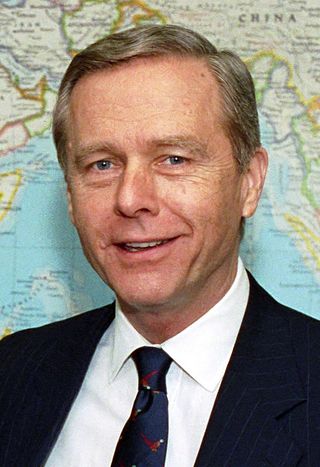
Peter Barton Wilson is an American attorney and politician who served as a United States senator from California from 1983 to 1991 and as the 36th governor of California from 1991 to 1999. A member of the Republican Party, he also served as the 29th mayor of San Diego from 1971 to 1983.

Samuel Ichiye Hayakawa was a Canadian-born American academic and politician of Japanese ancestry. A professor of English, he served as president of San Francisco State University and then as U.S. Senator from California from 1977 to 1983.

The 1984 United States Senate elections were held on November 6, with the 33 seats of Class 2 contested in regular elections. They coincided with the landslide re-election of President Ronald Reagan in the presidential election. In spite of the lopsided presidential race, Reagan's Republican Party suffered a net loss of two Senate seats to the Democrats, although it retained control of the Senate with a reduced 53–47 majority. Democrats defeated incumbents in Illinois and Iowa, and won an open seat in Tennessee, while Republicans defeated an incumbent in Kentucky.

The 1982 United States Senate elections were held on November 2, 1982. They were elections for the United States Senate following Republican gains in 1980. The 33 Senate seats of Class 1 were up for election in 1982. A total of four seats changed hands between parties, with Democrats winning seats in New Jersey and New Mexico, and Republicans taking seats in Nevada and the seat of the lone independent, Senator Harry Byrd Jr., in Virginia. Democrats made a net gain of one seat bringing them to 46 seats, while Republicans stayed at 54 seats for a majority. However, the Democratic gain in New Jersey replaced a Republican that had been appointed earlier in the year.

The 1980 United States Senate elections were held on November 4, coinciding with Ronald Reagan's victory in the presidential election. The 34 Senate seats of Class 3 were contested in regular elections. Reagan's large margin of victory over incumbent Jimmy Carter gave a huge boost to Republican Senate candidates, allowing them to flip 12 Democratic seats and win control of the chamber for the first time since the end of the 83rd Congress in January 1955.

The 1968 United States Senate elections were elections for the United States Senate. Held on November 5, the 34 seats of Class 3 were contested in regular elections. They coincided with the presidential election of the same year. The Republicans picked up five net seats in the Senate. This saw Republicans win a Senate seat in Florida for the first time since Reconstruction.

The 1998 California gubernatorial election was an election that occurred on November 3, 1998, resulting in the election of Lieutenant Governor Gray Davis as the state's first Democratic governor in 16 years. Davis won the general election by an almost 20% margin over his closest opponent, Republican Attorney General Dan Lungren. Davis succeeded Pete Wilson who was term limited.

The 1994 California gubernatorial election was held on November 8, 1994, in the midst of that year's "Republican Revolution". Incumbent Republican Pete Wilson easily won re-election over his main challenger, Democratic State Treasurer Kathleen Brown, the daughter of Pat Brown and younger sister of Jerry Brown, both of whom had previously served as governor. Although Wilson initially trailed Brown in the polls as a result of the state's faltering economy, his signature opposition to affirmative action and state services for illegal immigrants eventually led to his win. Wilson won 25% of the African American vote, a fairly strong performance for a Republican. However, he won only 25% of the Latino vote, a weak performance which was widely attributed to his support of Prop 187. This election was the first California gubernatorial election since 1974 in which the winner of the gubernatorial election was of a different party from the incumbent president.
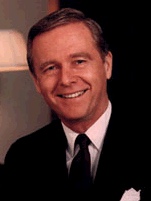
The 1990 California gubernatorial election was held on November 6, 1990. The Republican candidate, Senator Pete Wilson, defeated the Democratic candidate, former San Francisco Mayor Dianne Feinstein.
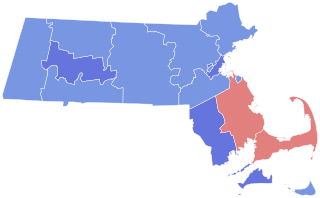
The 1984 United States Senate election in Massachusetts was held on November 6, to elect a member of the U.S. Senate from the State of Massachusetts. The election was won by Democrat John Kerry, the Lieutenant Governor of Massachusetts, who remained Senator until 2013, when he resigned to become United States Secretary of State. One-term incumbent Democratic Senator Paul Tsongas declined to seek re-election after developing cancer.

Barry Morris Goldwater Jr. is an American politician. He is a former Republican member of the United States House of Representatives from California, serving from 1969 to 1983. He is the son of U.S. Senator and 1964 Republican presidential nominee Barry Goldwater.

The 2004 United States Senate election in California took place on November 2, 2004 alongside other elections to the United States Senate in other states as well as elections to the United States House of Representatives and various state and local elections. Incumbent Democratic U.S. Senator Barbara Boxer ran for re-election and defeated Republican former Secretary of State Bill Jones. Boxer's 6.96 million votes set the all-time record for the most votes cast for one candidate in one state in one election, although it was surpassed by Senator Dianne Feinstein's 7.75 million votes in 2012.

From January 29 to June 4, 1996, voters of the Republican Party chose its nominee for president in the 1996 United States presidential election. Senator Bob Dole of Kansas, the former Senate majority leader, was selected as the nominee through a series of primary elections and caucuses culminating in the 1996 Republican National Convention held from August 12 to 15, 1996, in San Diego, California; Dole resigned from the Senate in June 1996 once he became the presumptive nominee to concentrate on his presidential campaign.
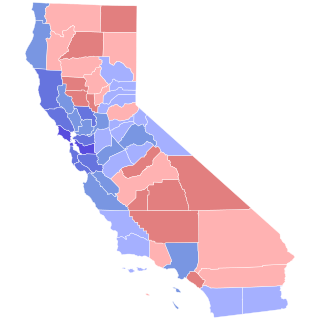
The 1992 United States Senate special election in California took place on November 3, 1992, at the same time as the regular election to the United States Senate in California. Feinstein defeated future California governor Gray Davis in the Democratic primary, while Seymour defeated William E. Dannemeyer in the Republican primary.

The 1988 United States Senate election in New Jersey was held on November 8, 1988. Incumbent Democratic U.S. Senator Frank Lautenberg won re-election to a second term with a margin of 8.37%. This is the last time that a Senate candidate was elected to the United States Senate in New Jersey at the same time that a presidential candidate of the opposite party won New Jersey.
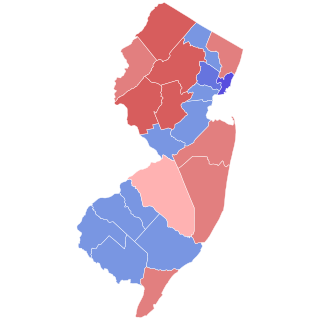
The 1982 United States Senate election in New Jersey was held on November 2, 1982.

The 1986 United States Senate election in California took place on November 4, 1986. Incumbent Democratic U.S. Senator Alan Cranston narrowly won re-election to a fourth and final term over Republican U.S. Congressman Ed Zschau. This was the last time where both major party nominees for the Class 3 Senate seat in California were men until 2022.

The 1976 United States Senate election in California took place on November 2, 1976. Incumbent Democratic U.S. Senator John V. Tunney ran for re-election to a second term, but was defeated by Republican S. I. Hayakawa. As of 2023, this is the last time an incumbent Democratic Senator from California lost re-election.

The 2020 United States House of Representatives elections in California were held on November 3, 2020, to elect the 53 U.S. representatives from the state of California, one from each of the state's 53 congressional districts. The elections coincided with the 2020 U.S. presidential election, as well as other elections to the United States House of Representatives, elections to the United States Senate, and various state and local elections.






















